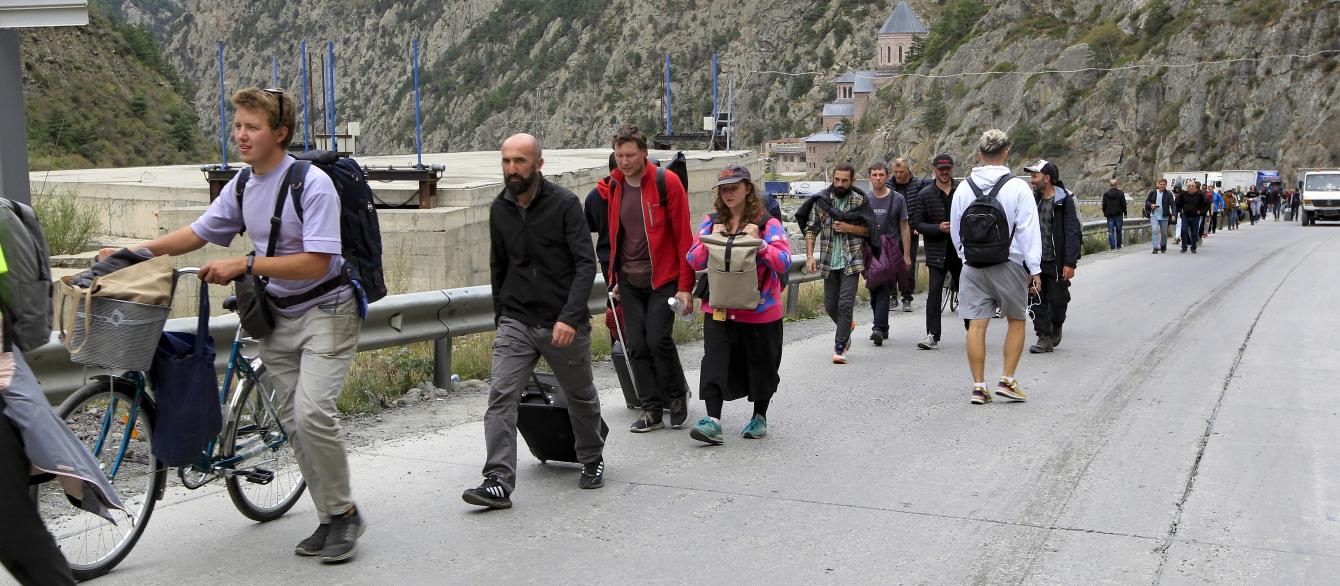A significant number of Russians fled their native land on the heels of Vladimir Putin’s decision to invade Ukraine in February 2022. Motivations for doing so were complex and multi-faceted; some left for principled reasons having to do with opposing Putin’s regime and the war in Ukraine, while others did so to enhance their personal and familial prospects or to avoid military service. These migrants—our choice of this term is deliberate, as it is not clear that they, as a group, should be regarded as refugees—left in two major waves, the first commencing immediately after the start of the invasion and running through the summer months of 2022, and the second beginning with the Kremlin’s announcement of a “partial mobilization” of military-age men at the end of September 2022 and gradually dwindling through the fall months. While these migrants decamped to a great number of countries, Armenia and Georgia were among the more popular destinations for reasons of proximity, cost, cultural familiarity, and the fact that both allow Russians to reside visa-free essentially indefinitely (Armenia does not even require an international passport for entry from Russia).
In order to assess why these migrants left Russia, what their views are on the war in Ukraine, and how they are coping in their new circumstances, we ran in-person surveys in both receiving countries starting in late 2022. All told, we managed to interview nearly 1,700 Russian expatriates, including 853 in the Georgian cities of Tbilisi (60%) and Batumi (40%), and 801 in Armenia’s capital of Yerevan. Of these, the vast majority left Russia after February 2022. Below we detail the most pertinent findings of our study (the full top-level report on this research, which was partially financed by the Davis Center, is available here). However, readers are cautioned that our surveys, given the population of interest, relied on convenience sampling and referrals in urban centers; as such, these findings are not necessarily representative of the underlying universe of Russian migrants.
Despite this limitation, the results of our research are intriguing. On the whole, the migrants we interviewed are younger (30 years old in Armenia and 33 in Georgia, on average) and better educated (more than 70% have completed their higher education) than the average Russian. They are also more likely to work in IT or similar high-tech fields, and to hail from major urban centers, with Moscow and St. Petersburg significantly over-represented in the two country samples. They are also more likely to have liberal views on a range of social issues and to be highly critical of Russian state structures. This naturally raises questions concerning what their departure will mean for Russia in economic, sociological, and political terms.
More specifically, roughly half of the Russians sampled in Armenia and Georgia report not yet knowing for how long they will remain abroad. But among those who claim to have left Russia forever, there are significant inter-country differences: 20% of those surveyed in Armenia gave this as an answer, whereas the corresponding figure in Georgia was only 12%. Similarly, 27% of respondents interviewed in Armenia report not feeling responsible for Russia’s political future, as compared to only 19% who gave this same answer in Georgia.
Respondents’ views on Russian institutions are quite negative among a significant majority in Armenia as well as Georgia, but they are more so among those who reside in the former. More dramatically, Ukrainian President Volodymyr Zelenskyi is given a positive assessment by 66% of respondents in Armenia but only 46% in Georgia. Meanwhile, Russian migrants in both countries exhibit generally positive attitudes towards the EU, NATO, and Western media.
In light of this, it is not surprising that overall our respondents place the blame for the war in Ukraine squarely at the feet of the Russian authorities (whom three-quarters of those surveyed in Armenia and two-thirds of those surveyed in Georgia blame for the conflict). At the same time, individuals who find themselves in Georgia report monitoring the progress of the war in Ukraine more intently, with over half stating they continue to follow it “very closely,” as opposed to just 40% that give a similar answer in Armenia.
Further highlighting differences between the Russians that chose to settle in Armenia versus Georgia, individuals interviewed in Armenia report having been more civically active before they left Russia, not just in terms of how intently they followed politics, but also in terms of their participation in various activities such as volunteering, donating money to NGOs, and organizing cultural events. Respondents based in Armenia are also more likely than those in Georgia to report that they had participated in protests against the invasion of Ukraine while they still resided in Russia (25% versus 11%, respectively).
Likewise, migrants residing in Armenia report significantly higher levels of political activism (e.g., discussing politics with friends and family members, posting content on social media) compared to those who find themselves in Georgia. Russians in Armenia have also built stronger ties with one another than have their Georgia-based counterparts. Nonetheless, respondents in both host countries rarely engage in volunteer activities or protests unrelated to the war in Ukraine.
Meanwhile, adjusting to new settings has proven challenging for Russians in Armenia as well as in Georgia, with respondents frequently stating that they have experienced material (e.g., finding a place to live or a job) as well as existential difficulties while in exile. However, here again we observe differences between migrants in the two host countries; in Armenia, respondents report experiencing psychological difficulties and problems maintaining relations with people still in Russia at far higher rates than in Georgia, which may—at least in part—be explained by the finding that individuals in the Armenian cohort not only tend to be more politically active, but also skew slightly younger and are more likely to be single.
Finally, Russian migrants in both Georgia and Armenia have substantially more liberal social attitudes compared to the general Russian population. This difference is particularly pronounced with regard to tolerance of same-sex relations: over 79% of those sampled in Armenia choose “definitely yes” when asked whether consenting adults have the right to enter into a same-sex relationship. While the commensurate number for Georgia is lower (approximately 36%), this is still far higher than in Russia, where a 2021 Levada Center survey found only 10% of the public agrees with this position. Worth noting, rates of LGBTQ acceptance among the Russian migrants are also far higher than in the host societies, which tend towards cultural conservatism (a 2017 Pew survey found that 98% of Armenians and 93% of Georgians do not believe homosexuality should be accepted by society).
It is difficult to determine how many individuals have left Putin’s Russia since February 2022; reasonable estimates place the figure at over 500,000, with some sources claiming the actual number may be closer to one million. If our respondents in Armenia and Georgia roughly approximate the demographic qualities and socio-political attitudes of this broader set of migrants, the long-term repercussions of this exodus for Russia will be profound. What is not yet apparent, however, is whether having such a young, highly educated, and liberal-minded segment of the Russian population choose the “exit” option will make it easier to further entrench Russia’s neo-authoritarian regime, or whether those exiting will become a network of political subversives, a highly critical “voice” working from the diaspora to change the face of Russian politics back home.










